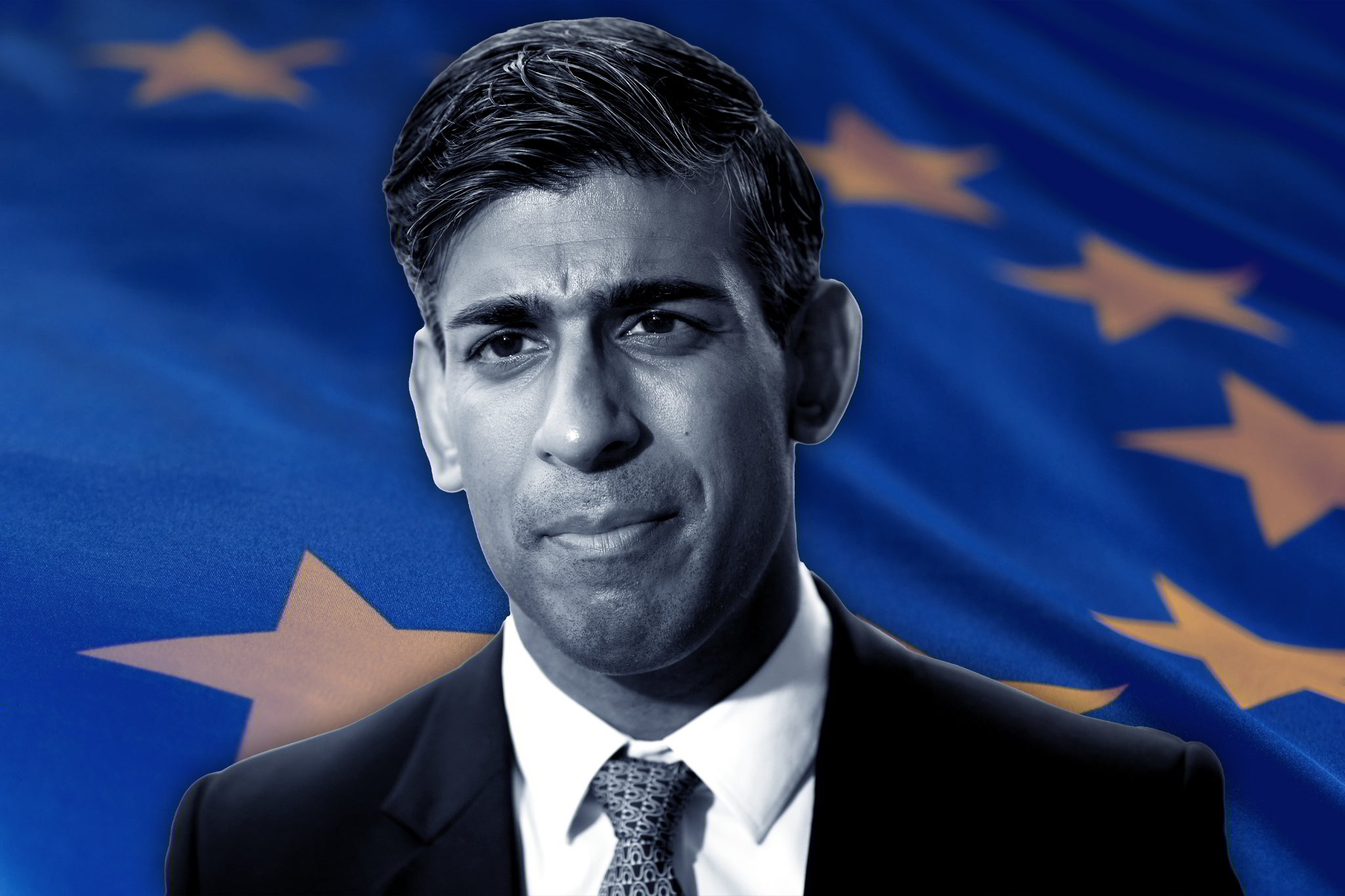Now even Brexiteers are blaming themselves for Britain’s economic woes
Brexit Britain is being held back by things like ‘poor international trade’ and ‘weak leadership’, which comes as a surprise to no one, writes Femi Oluwole – not even the prime minister


You probably didn’t fall off your chair when you read that Brexit Britain is being held back by things like “poor international trade” and “weak leadership”.
We already know that it’s a struggle to get food like we used to; that our economy has been affected – that our new border checks are affecting small businesses.
So, news that (according to the latest reports) the UK has dropped from 10th to 11th place in the Chandler Good Government Index (CGGI), partly because we rank 28th on international trade, is probably not a big surprise.
But what might be surprising is Rishi Sunak’s admission that “I’m sure changing our trading relationship with the EU is a big part of the reason why this is happening”, when asked why UK exports were lagging behind other G7 countries.
So – hey presto – the Tories are also blaming Brexit! That’s despite the Conservative government telling us to elect them specifically for Brexit, after four years spent debating whether Brexit would be good for the UK. Huh?
Still, it’s got to be a slap in the face for former chancellor Sunak, who last week insisted that “things are starting to feel better” and that confidence in the economy is growing after the UK economy moved out of recession (although he conceded it would “take time” for people to really feel the benefits).
He’s not wrong that it’s taking a while to feel them – after all, British decline has been linked to Brexit, weak leadership and poor finances in the latest damning report, which has also been backed up by the British Chamber of Commerce.
They surveyed UK trading businesses and 56 per cent said they were having difficulty trading under the Brexit rules at the end of 2022. And they’ve been complaining about Brexit damaging our trade as recently as 10 days ago. So, it looks like the experts and the Brexiteers are finally on the same page!
But are those trade barriers affecting people during the cost of living crisis? Experts at the Bank of England say Brexit is making our food more expensive. And when asked whether we’re paying the price of Brexit in our food bill, Conservative MP George Freemen said it’s “obvious” that “it has had some costs”.
That’s because the main promise of Brexit “taking back control of our laws” means that UK and EU products now follow different rules. So buying and selling things between each other needs a lot more paperwork, which is expensive. This hasn’t just affected food.
The Nuffield Trust tells us it is making medicines more expensive and harder to get for the NHS. Community Pharmacy England say it’s adding to our medicines shortages (but don’t worry. The NHS hasn’t had much else to deal with in recent years, so I’m sure that’s fine...)
And as we step forwards, we should know that our current trajectory is only going to get... worse. From this month, new import charges of up to £145 are being added to products like fish, sausages and cheese. Some importers say the bureaucracy will add up to 60 per cent to their costs.
Arch-Brexiteer Jacob Rees-Mogg himself called it an act of “self-sabotage” that will “disproportionately affect small and medium-sized businesses… who will be forced either to stop the imports or pass the costs onto consumers.”
It’s truly incredible (for want of a better word) watching Brexiteers at the highest levels of government tell us that the thing they spent half a decade promising would make us richer has in fact damaged every area of our lives.
Trade Secretary Kemi Badenoch said Brexit “has been more traumatic for [the car] sector”. And the UK car industry body, the SMMT, agreed with her in their 2023 report, saying “new [Brexit] trade barriers have impacted this highly integrated automotive supply chain.”
Boris Johnson himself even said the Brexit deal he negotiated and used to win his election was “undermining the balance of the Good Friday Agreement” (hardly surprising, knowing that Northern Ireland went without a government for two years because the DUP – who backed Brexit – revolted against the new border rules between Northern Ireland and Britain).
Or, hear it from Vote Leave MP Bernard Jenkin, who said: “British citizens [are] taking up citizenship in [EU] countries because their career opportunities are so limited compared to what they were.” I suppose that’s why today’s report shows the UK Passport is eight places behind Italy, Germany, France and Spain, in terms of the doors it opens?
There is a tragic yet inevitable beauty to the fact that we’re all now on the same page. The experts, the politicians and the public all agree Brexit is harming us financially, medically and geopolitically. Let’s see them try to spin that...

Join our commenting forum
Join thought-provoking conversations, follow other Independent readers and see their replies